 |
 |
 |
Following Don Revie's appointment as Leeds United manager in March 1961,
he took the club from the verge of the Third Division to a place among
the game's elite. Between 1964, when they won the Second Division championship,
and 1967, they had finished League runners-up twice, been beaten finalists
in the FA Cup and Fairs Cup, and reached two other semi-finals. They were unquestionably one of the most feared sides in the country,
for both their football and their confrontational approach, but they seemed
cursed when it came to collecting any silverware. The manager had always
been superstitious and a fatalist, but the way that luck constantly worked
against his team made him even more eccentric and uptight. Andrew Mourant: 'Revie's waking hours were riddled with phobias and rituals;
taking the same route to his dug out before a match, a fear of ornamental
elephants, a readiness to believe that a gypsy curse on Elland Road was
preventing his side winning, even a distaste for birds on pictures or
as motifs. 'Margaret Veitch's husband Peter remembers a visit Revie made to their
home in Pudsey shortly after they had done some decorating. "We wanted
to put some pictures up in the bedroom. The only ones I could get which
were small were birds. He wouldn't go in the bedroom. He said: 'What are
they doing there... you don't have birds in your house. You don't have
birds anywhere.' That's the reason the peacock was eventually taken off
the club badge. He wouldn't have birds." 'Two years after the Liverpool final, Revie summoned a gypsy from Scarborough
to Elland Road. Her mission was to exorcise whatever curse might be hanging
over the ground and bringing his team ill-luck in crucial matches. Lord
Harewood shared Revie's superstition about the possibility of peacocks
bringing ill-luck. "You can't defy a known superstition," he
says. "If you walk under a ladder, that's a dangerous thing to do
... it's a metaphor for being hanged ... in medieval times, people went
under the ladder to be hanged. If you believe that to defy those things
is a danger, then you are probably doing better not to defy them. I think
Don's weakness was fear of not knowing everything there was to be known
about the opposing side. That might have been carried to excess."' Such eccentricity was an ingrained part of Revie's character, as was
his caution, preoccupation with detail and over emphasis on the strength
of opponents. Those features were to change little in 1968, but at last
fortune smiled on Leeds United. The side was phenomenally successful on
all fronts and enjoyed a remarkable season. Terry Cooper and Eddie Gray became fixtures on the left flank, bringing
a skilful and progressive approach, and Don Revie finally bought a centre-forward
to replace the luckless Alan Peacock, who had suffered endless injury
problems throughout his career and figured in just nine games the previous
season. He was allowed to move on to Plymouth Argyle in October 1967,
a couple of weeks after the manager had broken the club's transfer record
by paying £100,000 for Sheffield United's centre-forward Mick Jones, who
had won England caps in 1965. As if to mark Jones' arrival, Leeds United demonstrated exactly how brilliant
they could be, on October 7 as they entertained a Chelsea side reeling
from the controversial departure of manager Tommy Docherty the previous
night. Leeds were clicking into top gear after a slow start and simply
ripped the Londoners apart. Billy Bremner, making his farewell appearance
before starting a four week suspension, enjoyed a startling performance,
finishing things off with a tremendous overhead kick as Leeds scored seven
times without reply, gaining some revenge for their defeat against the
same side in the Cup semi-final six months before. It was to be another couple of years before the resolute defence and
bitter attrition were fully traded in for attacking prowess and an expansive
game, but the controversy and outright war of previous years were starting
to become less prevalent. It would take some silverware on the shelf to
make Don Revie cast off the defensive shackles permanently, but Leeds
were giving less concrete evidence of their bully boy psyche. Their form in the League was good, especially at Elland Road, but they
ended the season with four straight defeats to finish fourth, with only
five points fewer than champions Manchester City. It was very disappointing,
but Leeds enjoyed greater success in the three Cup competitions. They broke their honours duck by beating Arsenal 1-0 at Wembley on 2
March to win the League Cup in a game which was even more dull than their
1965 FA Cup final against Liverpool. Terry Cooper's volley after 20 minutes
gave them a lead they never looked remotely in danger of relinquishing,
but they refused to take any risks and simply did what they needed to
frustrate the Gunners. After so many years of comparative failure, the
capture of a trophy was much more important than performing with style
and Revie's men had no intention of missing out again. The manager refused to make any excuses for the negative approach: 'I
wanted Leeds to play attractively as much as anyone, but under the circumstances,
we would have been foolish to attempt to do this. We were playing with
virtually nine fit men. I would never have included Greenhoff and Giles
had this been an ordinary League or Cup game, not in their physical condition.
But these two had been playing superbly, and I reasoned that they would
boost the rest of the team just by their presence on the field. 'It was impossible for us to look upon this as just another match. All
players are nervous at Wembley, but this was particularly true as far
as Leeds were concerned as it was so vital for us to win. The lads got
changed into their kit so early that Les Cocker and I had to give them
a sports quiz in the dressing room half an hour before the kick-off in
an effort They followed up by reaching another FA Cup semi-final, this time against
Everton, but Gary Sprake's wayward clearance left Jack Charlton little
alternative but to concede a penalty for handball and the only goal of
the game. The club's experience in the Inter Cities Fairs Cup was better. They
demolished Spora Luxembourg 16-0 on aggregate in the first round, then
ousted Partizan Belgrade, before seeing off three Scottish teams, Hibernian,
Rangers and Dundee, to qualify for a second successive final in the competition,
again held over to the start of the following season because of fixture
congestion. Three seasons of hard European competition had bred resilience in United
and they had perfected the art of two-legged competition. They faced the
formidable Hungarian team Ferencvaros with the first leg at Elland Road.
Mick Jones showed his value by forcing home a knock on from Jack Charlton
but Leeds could not add to the goal and pundits doubted their ability
to defend their lead in the Nep Stadium. However, a copybook defensive display with Gary Sprake playing the game
of his life withstood all the Hungarians' efforts and Leeds held out for
a splendid goalless draw to secure their second major trophy in six months. The success had a remarkable impact on the club and their home city,
lifting the depression that had started to descend upon them. The greater
significance, however, came with the change in press attitudes. Bagchi and Rogerson: 'There had been a sea change in the way they were
perceived. Having done to foreigners what they had done to domestic opposition
for years, they had finally become accepted by the English press, as much
for their spirit as for their prowess. Desmond Hackett of the Daily
Express, usually a critic, wrote, "When tired limbs screamed
rebellion over extra exertion, there was not one Leeds player who failed
to drive himself in that further yard of effort." This sort of acclamation
had been long overdue.' After years of seeing their approach pilloried, Leeds United now found
that the way their choking, ultra professional defensive style had outdone
the Europeans at their own game gained them new friends at home and abroad. Don Revie could be excused for sitting back with a glow of satisfaction,
but the twin triumphs only made him hungrier as he set his stall out for
the greatest prize of all, the Football League championship. Billy Bremner: 'When you haven't won anything, you're delighted to win
something; In the end, it was exactly the season that Revie had desired, as Leeds
United swept to a phenomenal championship triumph, breaking all manner
of records along the way - most points (67), beating the previous best
by Arsenal (1930-31) and Spurs (1960-61); most home points (39); most
wins (27); most home wins (18); fewest defeats (2), beating Arsenal's
previous best of four in 1930-31; the two away defeats was also a record;
going unbeaten at home equalled United's best, set in their 1963-64 Second
Division championship season; only 26 goals were conceded; and only nine
of those goals came at Elland Road. For all that sweeping dominance, however, it was no cakewalk, and it
was late February before Leeds could overtake long time leaders Liverpool.
They enjoyed a wonderful start, winning seven and drawing two of their
first nine games before defeats by Manchester City and Burnley set them
back on their heels. Three successive scoreless draws stabilised the ship
and signalled a 28 match unbeaten run with just 11 goals conceded. Ever
present Gary Sprake kept 24 clean sheets, with Reaney, Bremner and Hunter
also playing in every game, and Jack Charlton missing just one. Leeds
were the model of consistency and careful, cunning craft, denying all
comers and smothering opponents. They were helped by early exits from all the Cup competitions, giving
them a relatively easy time of things in the spring, when they would normally
have been so stretched. At the heart of it all was the cool, unflappable
intelligence that had marked Don Revie's playing career. United were smarter
and more focused than their rivals and left so little to chance that the
percentages constantly favoured them. With the versatile Paul Madeley deployed as a constant midfield blanket
in front of Charlton and Hunter, allowing Bremner and Giles to pull the
creative strings, the Leeds United of 1969 was an efficient, effective
and well oiled machine, never aspiring to greatness but consistently sustaining
functional supremacy. It was just as Don Revie had dreamed, and he was
rewarded with the Manager of the Year award to go with finally achieving
his aim of leading the best side in the country. When Bill Shankly and his fervent supporters on the Kop extended gracious
admiration to the Whites as they earned the decisive point from a goalless
game at Anfield in the season's penultimate game, it was the final crowning
Billy Bremner was similarly effusive. 'That wonderful night at Anfield
saw our burning faith in ourselves justified. At last we were well and
truly vindicated.' It was an interesting choice of words, but the one time outlaws could
be forgiven for gloating at being welcomed to the game's inner circle.
One journalist on a Sunday paper sounded a sour note, saying, 'It is a
pity that Leeds, so near to a championship they unquestionably deserve,
chose to parade their infuriating time-wasting tactics near the end.'
But the Elland Road ranks were by now well used to such jibes; in fact,
they rather took them as a compliment. After fifty years of mediocrity,
Leeds United had won three major trophies within the space of 14 months
and were without question England's premier team. There was absolutely no reason why the club should not have consolidated
their dominance at home and abroad. However, the next four years produced
a run of heartbreaks that had rarely been experienced by any other team.
Much was down to Revie's new found confidence, born from the sudden rush
of trophies. The attritional, defensive fortitude that had been their
watchword for almost a decade was traded for a more progressive approach.
It was undoubtedly easier on the eye, but it meant that risks were taken
and opponents found it easier to play their own game. The first sign of the softening of attitude came with Don Revie's decision
to break the transfer record by splashing out £165,000 on Leicester City's
accomplished young goal getter Allan Clarke. Goals had always been hard
to come by for Leeds, and for years they had relied on a single target
man ploughing a lone furrow up front, with first Alan Peacock and then
Mick Jones facing a thankless task. Now Revie paired Clarke with Jones
and goals began to flow from their sweeping attacks. The first signs were promising. Leeds beat Manchester City at the start
of the season to win the FA Charity Shield and soon Jones and Clarke had
forged a prolific partnership. Aided and abetted by Peter Lorimer on the
right flank the goals flowed, and never more so than in the club's European
Cup debut when they put sixteen goals without reply past Lynn Oslo, the
part timers from Norway. However, a season foreshortened by England's early departure to Mexico
to defend their World Cup crown brought nothing but heartbreak for Leeds
United. Billy Bremner and Don Revie were Footballer and Manager of the
Year, and for many months looked likely to celebrate a remarkable treble
of league title, European Cup and FA Cup, but unprecedented fixture congestion
destroyed both their chances and the players. In March and April, Leeds
played 17 matches, with 9 of them squeezed into the space of 22 days. Revie's long running feud with Football
League secretary Alan Hardaker meant that he got little sympathy when
requesting assistance with rearranging fixtures, and something had to
give. First the League title race was conceded to Everton when Revie incurred
Hardaker's wrath by fielding teams made up entirely of reserves. The manager
decreed that the European Cup and the FA Cup took precedence over the
League, but a succession of replays, injuries and exhaustion took its
deadly toll. Leeds hammered Chelsea in the Cup final with Eddie Gray enjoying the
game of his life, but lapses in concentration allowed the Londoners to
steal two equalisers. Then Celtic caught United on two off nights in the
European Cup semi-final to eliminate them with some ease. The season ended
in empty bitterness when Chelsea came from behind in the Cup final replay
at Old Trafford to snatch an extra time winner. It is difficult to overstate the depth of the despair that engulfed the
Elland Road club in that doom-laden spring. If nothing else, Don Revie
finally appreciated the risks of over-ambition and spreading the jam too
thinly. It was a heart-rending way to learn. During that summer, though, warmed by the adventure of Brazil's World
Cup triumph, Revie waxed lyrical about his Elland Road family and his
philosophy: 'Some time before Leeds United won the first of the honours that have
come our way in recent seasons, I told a gathering of the players that
if they became champions they would realise that there was more to it
than being the top team. I cannot recall my exact words, but remember
well the gist of them, which was that it was not sufficient merely to
become champions; of equal importance in my book was to behave like champions,
off as well as on the field. This can have many aspects: behaviour on
the field, behaviour away from it; appearance on the field, conduct off
it. 'We have today a situation in which a team taking the title becomes subject
to constant survey - has the eyes of public upon its every action. In
addition, as more and more clubs enter into European competition so the
image of the British footballer, and through him the Briton himself, is
spread further afield with more and more coverage by the press and television. 'We thus have the situation in which any club and its players are faced
with the dual problem - that of winning matches and doing so with dignity
on and off the field. I could be said, perhaps, to be particularly conscious
of this, because of what I still believe to be a totally unfair impression
given abroad about Leeds when we first started to chase the honours. I
refer, of course, to the suggestion that we were more physical than skilful.
I have never subscribed to any such view, neither did I to any suggestion
that we were more a defensive side than anything else. Fortunately, for
my beliefs the events of the past few seasons have spoken for themselves
and now Leeds are hailed as a side containing as many skills as any, and
more than most. 'I recall George Best being asked last season how he rated Leeds. He
replied, "Their strength is 'On arrival at Elland Road any new boy, be he a young apprentice professional
or an already established star, is quick to appreciate that he should
combine courage, hard but fair play and complete confidence on the field,
with courtesy, good conduct, manners and humility away from it. 'The idea behind all this is to ensure that so far as is humanly possible
every lad on the staff has, within a short time of joining Leeds United,
been taught sufficient to feel comfortable in any kind of company, able
to enter any hotel he wishes and also made aware of the temptations as
well as the honours and awards that can come his way. I have heard it
said that this is not the function of a football club; that a club's sole
concern should be in the promotion of a fine football side and to the
winning of more matches than achieved by the opposition. But surely it
is all part and parcel of the same thing. 'Let me say immediately that no one is more aware than we at Elland Road
of the importance of winning matches and of establishing a fine football
side with which to do so. Indeed that is the major purpose behind everything
we do, but there are others ancillary things to be considered. One is
that while winning matches is of vital importance, the manner in which
successes are achieved must also be considered. The other vital factor
ancillary to winning matches, and winning them in the right spirit, is
that the boys who obtain these honours for a club and its city, and in
turn is feted by them, should be honourable representatives of that club,
and that city. 'As I said earlier, let there be no question of us trying to put manners
before everything else. We are part of a football club, and a successful
one at that, and such successes have been achieved only by a complete
one hundred per cent dedication - being able to match skill with sinew
when required in hard but fair combat with the opposition. But within
that requirement it is possible for football to uphold the dignity it
has brought into the twentieth century's later years. At the turn of the
century and for many years thereafter this great game was considered something
of a festival of the cloth capped. That was never completely accurate.
The game has always attracted the intelligentsia - though in much lower
numbers it must be admitted - now, of course, are there are almost as
many egg-heads as those of other shapes attracted to, and attending the
game. 'Football has indeed, arrived. It is recognised for what it is - a great
game for the masses, a source of entertainment for the millions and a
combination of employment and enjoyable activities to the fortunate thousands
earning their living from the game. 'Often I think that winning a trophy is almost the easiest part of the
exercise. Retaining it, and at the same time one's sense of purpose, modesty
and place in things is infinitely more difficult. 'But that's what I expect from my players.' His monologue seemed anachronistic, and strangely out of touch with the
times; his preoccupation with standards smacked a little of hypocrisy
as his team had only recently abandoned the bully boy approach which Collins
had fostered. Clearly, Revie was trying to paint his charges as being
the saviours of a game that was often accused of bringing out the worst
in people. At the start of the year, he had received an OBE for services to football,
and was obviously taking his new found status very seriously. He hinted
as such in his comments at the time: 'My award should be recognised as
a club rather than personal achievement, because without the talent, character
and dedication of everyone connected with the club, By the time the new season came around, the memories of the disappointing
spring had faded and Revie had once more worked the miracle of reviving
exhausted and dispirited warriors. He had told his shattered players in
the Old Trafford dressing room, after the defeat to Chelsea, 'Forget this
season … it cannot be revived. We've got to start all over again. We've
done it before and we can do it now.' True to Revie's words, Leeds once more set a stunning pace in the League,
only to be caught again, this time after a phenomenal run by Double winners
Arsenal. The season would be lastingly remembered for two disastrous matches
that are indelibly etched in the memories of Leeds fans. In the fifth round of the FA Cup they travelled to face Fourth Division
Colchester United at Layer Road with the odds heavily stacked in their
favour. By the end of the game, they had been humbled by veteran former
England forward Ray Crawford who got two of the goals which left Leeds
3-0 down. They pulled two back but went out in one of the most remarkable
of all Cup upsets. Then as the League season reached its tense climax and with Arsenal,
with a succession of 1-0 victories, snapping at their heels, the fates
turned once more against United. With Leeds losing at home to West Brom,
and chasing the game, the most perverse of refereeing decisions provoked
a riot at Elland Road. Andrew Mourant: 'Their composure was undone by some grotesque refereeing
by Ray Tinkler. Leeds were already 1-0 down and fighting to stay in the
match when a misplaced pass by Norman Hunter bounced off Albion's Tony
Brown. As Brown embarked on an optimistic chase towards the Leeds goal,
linesman Bill Troupe raised his flag for offside against Colin Suggett
who was several yards ahead of play. Brown stopped; all the Leeds players
stopped, until Tinkler, to the astonishment of all, waved play on. Brown,
almost diffidently, continued his journey towards Sprake's goal before
squaring the ball to Jeff Astle whose sidefoot shot made it 2-0. For Leeds
the match was now irretrievable. 'Millions watching television witnessed Revie's rage and despair. The
sense of menace at Elland Road was intense; but this was not the posturing,
manufactured rage generated by gangs of penned hooligans. The pitch invasion,
if that it may be called, was quite spontaneous and involved a handful
of unconnected spectators from various parts of the ground, among them
middle-aged men. "Tinkler," Revie said, "ruined nine months
of hard work. At 1-0 down, Leeds were fighting back and Albion starting
to crack." For Revie and the Elland Road faithful, Ray Tinkler's
decision was one disappointment too many. It defeated the Leeds manager's
oft-practised self-control.' Despite the despair of once more ending runners-up after Arsenal won
1-0 at Tottenham in the last game of season (United's finishing total
of 64 points was a new record for a side finishing second), Leeds did
at least finish with a trophy. They defeated Juventus on the away goals
rule to recapture the Fairs Cup, in the process becoming the final holders
of the trophy, before it was replaced by the UEFA Cup. The pitch invasion resulted in a fine for Revie and an order that Leeds
should have to play a clutch of their early home games away from Elland
Road, giving them a mountain to climb at the start of the 1971/72 season.
For once Leeds did not storm away from the field as the battle was fought
out by four clubs, with Derby, Liverpool and Manchester City all vying
with United for the title. The form shown by the Whites in the spring, however, was the talking
point of the season as they beat Manchester United 5-1, Arsenal 3-0 and
Nottingham Forest 6-1, but it was a startling match on March 4 against
Southampton that really stood out. Playing before the Match of the Day
cameras, Leeds hit peak form, striking home seven goals without reply,
but it was the manner of the performance that was important. With the result certain, the ultra confident Leeds players aired their
party pieces as they tortured outclassed opponents with some amazing possession
football. The Saints could do nothing and were teased and tormented by
the flicks, There were too many defeats woven in amongst all the magic, but still
Leeds looked the likeliest title winners, also enjoying an FA Cup run
that took them all the way to a Wembley date with holders Arsenal in the
competition's centenary year. It was by no means a classic final but Leeds had the better of things
and won the trophy for the first time in their history when Allan Clarke
dived full length to head home Mick Jones' teasing cross for the only
goal of the game. There were no after match celebrations, however. There was a date with
destiny two days later as Leeds travelled to Wolverhampton for their final
game in the league, knowing that a draw would be enough for them to overtake
leaders Derby County and claim the Cup and league Double. Tiredness and injuries led to a depleted team walking out for the match,
but there were few who would bet against Leeds getting the point they
needed. Inexplicably, however, Wolves raised their game and blitzed United. Even so, Leeds had enough chances to win the game and were denied at
least one blatant penalty, but the season again ended in disappointment
with a 2-1 defeat leaving Leeds runners-up for the third successive year.
Revie remarked, 'It's just too much, we should have had three clear penalties.
But I was proud of the team. I don't know where they got the energy from
in the second half.' This was now a depressingly familiar routine for Don Revie. He railed
against the intransigence of officialdom and let rip with his paranoia,
but it seemed that Leeds could not avoid choking when the pressure really
came on. Even playing their most irresistible and attractive football,
finally putting behind them the controversy of the Sixties, the team could
not close off business. What was even more remarkable than their consistent failure, however,
was the players' constant ability to come back from the ashes of despair
to emerge, refreshed and ready to go at the start of the next season.
Lesser teams would have fallen away, but year after year Leeds United
were back, making the pace and showing the way. In 1972/73, however, Leeds were always too far away to mount a serious
title challenge as Liverpool and Arsenal contested things. It was in many
ways a below par season, and strangely low key. A third place finish was
disappointing, but there were the customary Cup runs and Leeds reached
the finals of both the FA Cup and the European Cup Winners' Cup. The first of these pitched Revie against his old nemesis Bob Stokoe.
The former Bury manager was now boss of Second Division strugglers Sunderland,
whom he had revitalised, with a semi-final victory over Arsenal already
to their credit. The United party was as tense and fractious as their
manager, while the Wearsiders were relaxed and ready to enjoy the day.
Cheered on by the neutrals, Sunderland took the lead in the first half
when Ian Porterfield fired home a memorable goal. Leeds pressed forward in the second half, but their conviction was badly
dented when Sunderland keeper Jim Montgomery pulled off a historic double
save, parrying Trevor Cherry's close range header before somehow recovering
to fling himself across the goal area to push Peter Lorimer's point blank
shot onto the crossbar and out. A week later, a line-up without Bremner, Clarke, Giles and Gray was robbed
of glory in What was even more dispiriting for Leeds during that Greek tragedy, was
the news that Everton had approached Don Revie to take over at Goodison
Park. It was rumoured strongly that Revie had decided to accept their
lucrative offer and move on from the club he had joined nearly fifteen
years before. In the end, however, his insecurity and love of control persuaded Revie
to reject all the Everton overtures and pledge his future once more to
Leeds United. The players whom he had spent more than a decade grooming
were growing old together, and rebuilding was long overdue, but Revie
decided that there was time for one last hurrah. He resolved that 1973/74
would somehow be different from the recent past. However, at least one of his loyal lieutenants would no longer be around
to enjoy the ride: 38-year-old Jack Charlton finally decided to hang his
boots up, taking on his first managerial role at lowly Middlesbrough.
Revie had wanted Charlton to stay on at least in a coaching role, but
accepted the inevitable. He had been attempting unsuccessfully to find
a replacement for years, but both Sutton United's John Faulkner and Huddersfield
Town's Roy Ellam had been found wanting. However, the giant young Scot
Gordon McQueen, who had arrived in a £30,000 deal from St Mirren in May
1972 had been blooded and was ready to take over. McQueen was one of a number of younger players whom Don Revie had started
working into his mix, with Joe Jordan, David Harvey, Terry Yorath, Frank
Gray and Trevor Cherry offering new options. 1972/73 had been an irritable, bad tempered season with a succession
of disciplinary problems. Don Revie promised the press that the club had
turned over a new leaf and would be whiter than white in the new season.
He shocked his experienced squad by announcing, with the utmost conviction,
that they would win the League championship and achieve another, less
likely, distinction along the way. Allan Clarke: 'The Gaffer said, "Right, lads, we've been the best
team for the last decade. I know we haven't won as much as we should have,
but that's in the past. Now I've had a thought in the close season - can
we go through the whole campaign unbeaten?" We all looked at each
other in silence and then, after a while we said … "Yes, it's possible."
It was certainly a different pep talk to most seasons. Of course you start
off aiming to win all your games, but to actually set it as a target -
that was different.' It was a far-fetched notion, but the vaulting ambition of Revie's vision
had an invigorating impact on his charges and they began the season in
spectacular fashion, playing some of their best football. Their expansive
attacking game was simply breathtaking, sweeping all comers aside, as
the first seven games were all won with 19 goals scored against just four
conceded. But it was the manner of their performances that evoked the
greatest reaction. In a report of the seventh of those victories, John Arlott wrote eloquently
in the Guardian, 'Wearing the white strip of a blameless life,
Leeds moved in a ceaseless flow, back in packed defence, competing for
the midfield, sweeping forward and with backs overlapping. Yet it was
all so controlled, almost amiable … so free from the aura of violence
they used to generate.' The winning run came to an end when Manchester United forced a goalless
draw at Elland Road on September 22, but Leeds continued in imperious
fashion, outclassing most of the sides they faced. Eventually, draws started
to appear rather too regularly for Revie's comfort and a lapse in form
accompanied the lengthy injury absence of Mick Jones, Johnny Giles and
Eddie Gray. Jordan, Yorath and Bates were sound, if limited, deputies,
but Leeds' resources were increasingly strained. The old stagers Reaney,
Bremner, A long unbeaten run saw Leeds develop a comfortable points advantage
over a trailing Liverpool side, but eventually the sequence became a millstone
as tension crept into Leeds United's play. The side avoided defeat in
the first twenty-nine games, but they had drawn four of their previous
seven league matches when they were spectacularly dumped out of the FA
Cup at the fifth round stage by a determined Bristol City side. In the next match, away to Stoke City, the composure seemed to have returned
as Leeds built up a 2-0 lead with goals from Bremner and Clarke, but then
the Potters fought back and pulled off a breathtaking 3-2 win. The defeat sent a shock wave through Revie and his men. They won one
and drew two of their next three games, but then stuttered to three straight
defeats, with the 4-1 reversal against Burnley particularly embarrassing.
More damaging, however, was a 1-0 defeat at chasing Liverpool, as the
Merseysiders steadily and inexorably hauled in Leeds' points advantage,
which once stood at 9. Was there going to be another, all too familiar,
disaster? Happily, United rallied at the death, with a 2-0 win at home to Derby
ending the losing streak. Liverpool stuttered under their own fixture
congestion on their way to an FA Cup triumph, and Leeds eventually secured
the title without even playing, when old rivals Arsenal pulled off a 1-0
win at Anfield. It left the Whites to celebrate their second title triumph
with a single goal victory in the last game of the season at Queens Park
Rangers. The relief was evident in Don Revie's voice as he remarked, "I feel as
though someone has come along and lifted six tons of coal off my back.
I feel as though I am walking on air. This is the greatest moment of my
life. Deep down, I thought our chance had gone after three defeats on
the trot before Easter. All credit to Billy Bremner and the lads for coming
back. That is the mark of true champions." He sounded chirpy enough, but
Peter Lorimer hinted at the strain he had been under: "During those last
couple of months he looked as if he'd aged about five years." Leeds United had almost contrived to throw away a season's hard work
in a few short weeks, but had somehow found the backbone and resolve to
do enough to secure a memorable title win. It proved to be the epitaph for the manager at Elland Road, for within
weeks of receiving the championship trophy, he was contemplating a new
career and a new challenge, ending an association that had lasted nearly
sixteen years. Don Revie and Leeds United had been inextricably interlinked
for what seemed an age - now they were going their separate ways and life
would never be the same again for either party. Part
1 An Appreciation - Part 2 Learning the ropes
1927-51 - Part 3 Centre stage with City 1951-56
- Part 4 Shuffling off stage 1956-61 - Part
5 On the march with Leeds United 1961-67 - Part
7 Inn-gerland! 1974-77 - Part 8 Disgrace and
despair 1977-89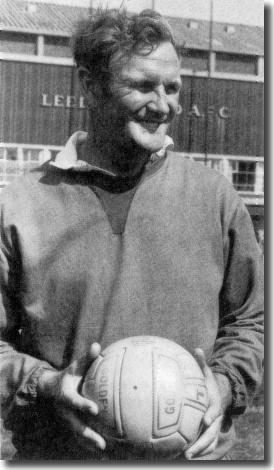 Part
1 An Appreciation - Part 2 Learning the ropes
1927-51 - Part 3 Centre stage with City 1951-56
- Part 4 Shuffling off stage 1956-61 - Part
5 On the march with Leeds United 1961-67 - Part
7 Inn-gerland! 1974-77 - Part 8 Disgrace and
despair 1977-89
Part
1 An Appreciation - Part 2 Learning the ropes
1927-51 - Part 3 Centre stage with City 1951-56
- Part 4 Shuffling off stage 1956-61 - Part
5 On the march with Leeds United 1961-67 - Part
7 Inn-gerland! 1974-77 - Part 8 Disgrace and
despair 1977-89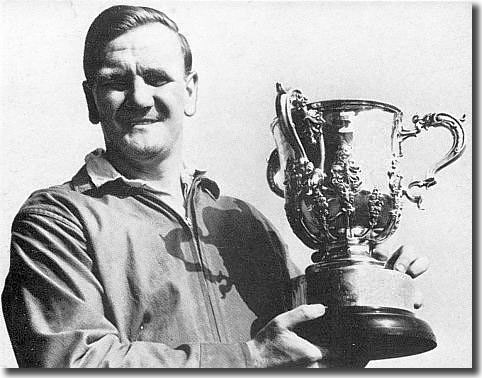 to
stop them dwelling on the game. It's funny, but they were under so much
mental pressure during the match that at the final whistle they were relieved
rather than elated!'
to
stop them dwelling on the game. It's funny, but they were under so much
mental pressure during the match that at the final whistle they were relieved
rather than elated!'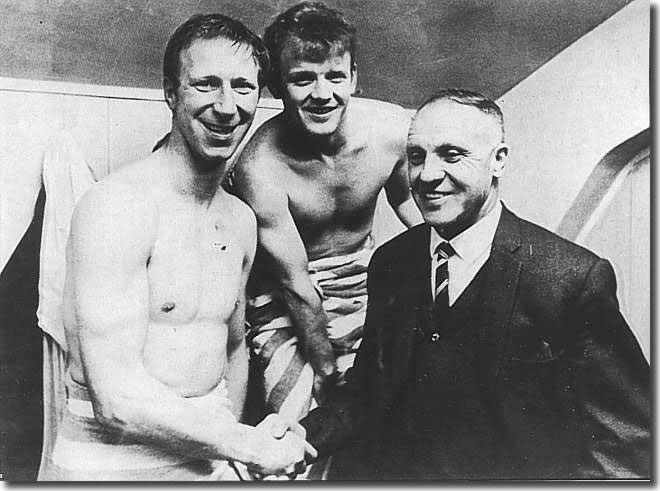 but
as soon as a new challenge is offered, you have to climb higher. And so
we climbed that little bit higher, in going for the league.'
but
as soon as a new challenge is offered, you have to climb higher. And so
we climbed that little bit higher, in going for the league.'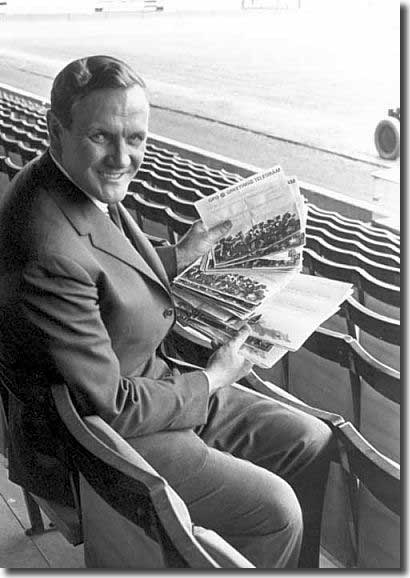 moment
for Don Revie, who said, 'The reception given us by the sporting Liverpool
crowd was truly magnificent, and so, for that matter, was our defence
tonight. It was superb in everything.'
moment
for Don Revie, who said, 'The reception given us by the sporting Liverpool
crowd was truly magnificent, and so, for that matter, was our defence
tonight. It was superb in everything.'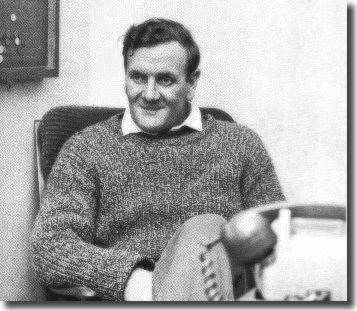 that
they have no weaknesses: they also possess a tremendous team spirit and
players of great individual skills." I like to think that George
was echoing the thoughts of most of the people in football, but for a
long time we had to suffer other things being said about us, and bear
it with dignity. And that is what being champions is all about really
- wearing a crown with dignity.
that
they have no weaknesses: they also possess a tremendous team spirit and
players of great individual skills." I like to think that George
was echoing the thoughts of most of the people in football, but for a
long time we had to suffer other things being said about us, and bear
it with dignity. And that is what being champions is all about really
- wearing a crown with dignity.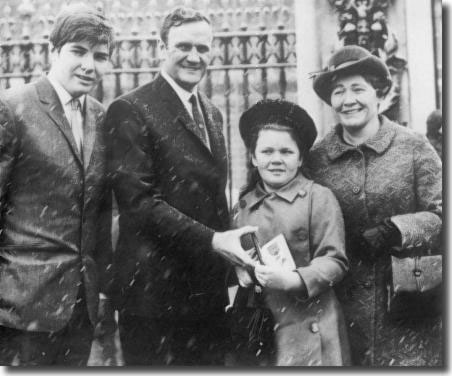 my
success as a manager would not have been possible. When I went to Buckingham
Palace I collected the award on behalf of Leeds United.'
my
success as a manager would not have been possible. When I went to Buckingham
Palace I collected the award on behalf of Leeds United.'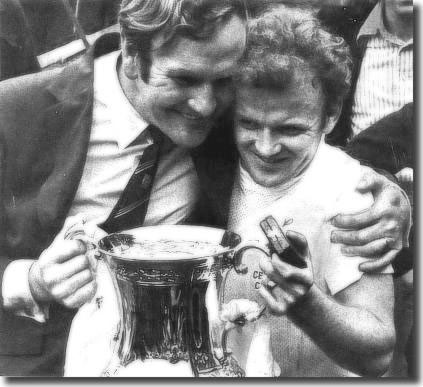 tricks and long balls, as Revie's men came as close to perfection as any
team had ever done.
tricks and long balls, as Revie's men came as close to perfection as any
team had ever done.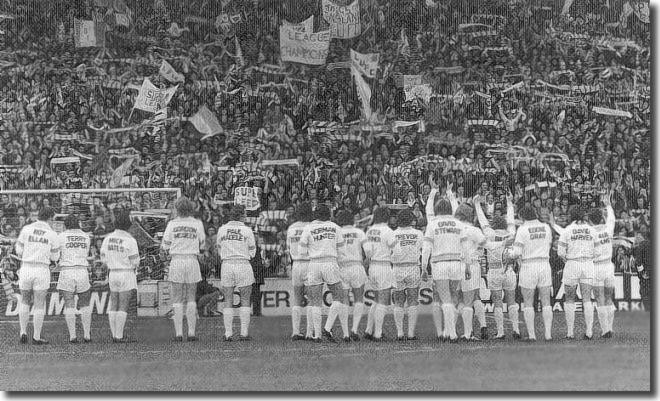 the
Cup Winners' Cup final against AC Milan. The Greek referee gave a desperately
one eyed performance, denying Leeds at least two penalties, and was booed
off at the end, after a single early goal gave the Italians a notorious
victory.
the
Cup Winners' Cup final against AC Milan. The Greek referee gave a desperately
one eyed performance, denying Leeds at least two penalties, and was booed
off at the end, after a single early goal gave the Italians a notorious
victory.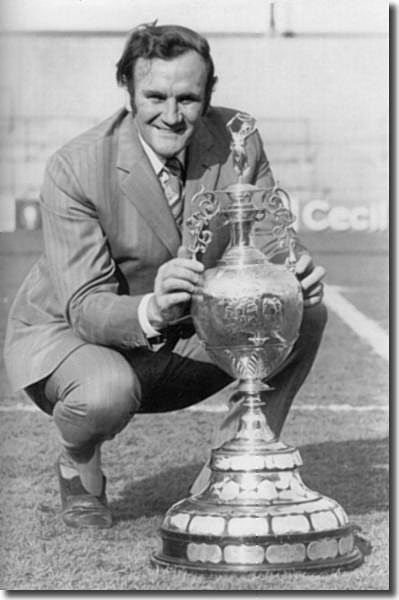 Hunter,
Clarke and Lorimer were outstanding, while the reliable Harvey and Cherry
made emphatic contributions.
Hunter,
Clarke and Lorimer were outstanding, while the reliable Harvey and Cherry
made emphatic contributions.